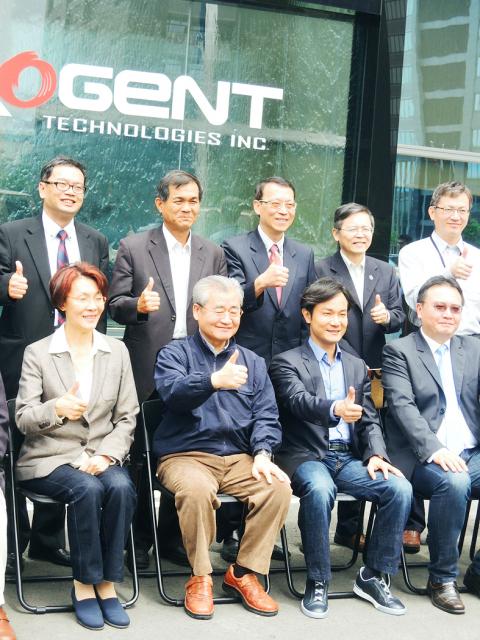Kaohsiung City Government officials yesterday rebutted Premier Mao Chih-kuo’s (毛治國) comments that southern Taiwan lacked job opportunities in the high-tech sector, saying the central government must shoulder some of the blame.
When visiting the Kaohsiung Software Park and experiencing first-hand some of the products yesterday, Mao said that a friend living in southern Taiwan told him that his son had recently gained a university degree but was unable to find a job in the technology industry in southern Taiwan.
The friend said that if his son looked for a job in northern Taiwan, he would have to dip into his retirement fund to help, Mao said, adding that his friend asked whether the government would be able to do something about the matter.

Photo: Ke Yu-hao, Taipei Times
Kaohsiung Deputy Mayor Hsu Li-ming (許立明), the city’s Economic Development Bureau Director Tseng Wen-sheng (曾文生) and a number of southern Taiwan university deans, present at the talk, appeared unhappy on hearing the comment.
Mao went on to say that he hoped Brogent Technologies, the booth he was visiting at the time, would help the nation find its path in the information technology industry, adding that he hoped the nation’s information and communication technology companies would step up its transition to add value to the industry.
After the event, Tseng, in response to reporters’ questions about Mao’s comments, said that Kaohsiung has made great strides in improving the performance of its industries, adding that as industrial planning and development policies were in the hands of the central government, it was also responsible for the lack of high-tech industry firms based in southern Taiwan.
A member of the public attending the event added that the Chinese Nationalist Party (KMT), had designated Kaohsiung as the nation’s main area for the petrochemical and iron industries, adding that any move toward high technology was after the city government developed the software park.
“The premier’s comments come as a slap in the face to the local government as well as to his own [central government],” said the member of the public who declined to be named.
Kaohsiung’s National Sun Yat-sen University dean Yang Hung-tun (楊弘敦) said that the industrial sector is beginning to take shape in the city, adding that 25 junior colleges as well as 10 to 20 businesses have formed an association to help students find jobs in the industry.
“We hope that students from southern Taiwan will be encouraged to stay and will not have to go to Taipei just to find a job,” Yang said.
Meanwhile, Kaohsiung City Councilor Lee Po-yi (李柏毅) of the Democratic Progressive Party (DPP) said that when Kaohsiung was rocked by the gas pipeline explosions last year, Mao, then-vice premier, did not visit, adding that since Mao became premier earlier this year, he had only visited the municipality two or three times.
“A premier who is not concerned about Kaohsiung is in no position to make such comments,” Lee said, adding that “Mao should be working with Kaohsiung and formulating policies that help the municipality’s high-tech industry find its footing instead of offering criticism.”

Chinese Nationalist Party (KMT) Chairman Eric Chu (朱立倫), spokeswoman Yang Chih-yu (楊智伃) and Legislator Hsieh Lung-chieh (謝龍介) would be summoned by police for questioning for leading an illegal assembly on Thursday evening last week, Minister of the Interior Liu Shyh-fang (劉世芳) said today. The three KMT officials led an assembly outside the Taipei City Prosecutors’ Office, a restricted area where public assembly is not allowed, protesting the questioning of several KMT staff and searches of KMT headquarters and offices in a recall petition forgery case. Chu, Yang and Hsieh are all suspected of contravening the Assembly and Parade Act (集會遊行法) by holding

PRAISE: Japanese visitor Takashi Kubota said the Taiwanese temple architecture images showcased in the AI Art Gallery were the most impressive displays he saw Taiwan does not have an official pavilion at the World Expo in Osaka, Japan, because of its diplomatic predicament, but the government-backed Tech World pavilion is drawing interest with its unique recreations of works by Taiwanese artists. The pavilion features an artificial intelligence (AI)-based art gallery showcasing works of famous Taiwanese artists from the Japanese colonial period using innovative technologies. Among its main simulated displays are Eastern gouache paintings by Chen Chin (陳進), Lin Yu-shan (林玉山) and Kuo Hsueh-hu (郭雪湖), who were the three young Taiwanese painters selected for the East Asian Painting exhibition in 1927. Gouache is a water-based

Taiwan would welcome the return of Honduras as a diplomatic ally if its next president decides to make such a move, Minister of Foreign Affairs Lin Chia-lung (林佳龍) said yesterday. “Of course, we would welcome Honduras if they want to restore diplomatic ties with Taiwan after their elections,” Lin said at a meeting of the legislature’s Foreign Affairs and National Defense Committee, when asked to comment on statements made by two of the three Honduran presidential candidates during the presidential campaign in the Central American country. Taiwan is paying close attention to the region as a whole in the wake of a

OFF-TARGET: More than 30,000 participants were expected to take part in the Games next month, but only 6,550 foreign and 19,400 Taiwanese athletes have registered Taipei city councilors yesterday blasted the organizers of next month’s World Masters Games over sudden timetable and venue changes, which they said have caused thousands of participants to back out of the international sporting event, among other organizational issues. They also cited visa delays and political interference by China as reasons many foreign athletes are requesting refunds for the event, to be held from May 17 to 30. Jointly organized by the Taipei and New Taipei City governments, the games have been rocked by numerous controversies since preparations began in 2020. Taipei City Councilor Lin Yen-feng (林延鳳) said yesterday that new measures by